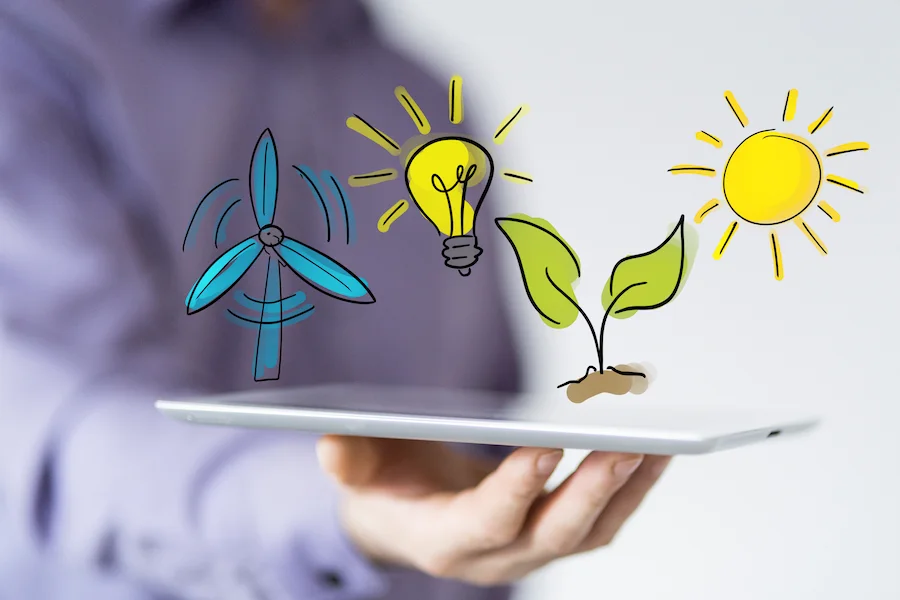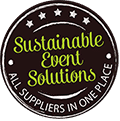Was haben die Sustainable Development Goals, kurz SDGs, mit Veranstaltungen zu tun? Eine ganze Menge! Die Integration der SDGs in Veranstaltungen ist ein wichtiger Schritt auf dem Weg zur Nachhaltigkeit. Durch eine bewusste Eventplanung und die Umsetzung nachhaltiger Praktiken können auch Ihre Veranstaltungen einen wichtigen Beitrag zur Lösung globaler Probleme leisten und zugleich zu einem Vorbild für Nachhaltigkeit werden. Aus diesem Grunde stellen wir Ihnen heute das “SDG 12 – Nachhaltiger Konsum und nachhaltige Produktion” vor.

SDG 12 – Nachhaltiger Konsum und nachhaltige Produktion
Das SDG 12 zielt auf die notwendige Veränderung unseres Lebensstils und unserer Wirtschaftsweise ab. Wir müssen (wieder) innerhalb der planetaren ökologischen Grenzen konsumieren und produzieren. Das bedeutet, dass wir unseren Konsum und unsere Produktion weitgehend den Ressourcenverbrauch sowie die Emission von Treibhausgasen reduzieren müssen. Das SDG 12 meint sowohl den individuellen Konsum jedes und jeder Einzelnen von uns als auch auf die Umgestaltung unserer Produktion. Kreislaufwirtschaft und nachhaltige Lieferketten sind dabei zentrale Bestandteile dabei ebenso wie die Vermeidung oder die verantwortungsvolle Entsorgung von Abfällen. Laut SDG 12 soll die Nahrungsmittelverschwendung bis 2030 halbiert werden.
Das bedeutet das SDG 12 für Veranstaltungen
Eventplanende und alle für Veranstaltungen tätigen Dienstleister können durch eine Vielzahl von Maßnahmen aktiv zur Erreichung des SDG 12 beitragen. Durch die Umsetzung nachhaltiger Praktiken können Veranstaltungen und ihre Akteure einen wichtigen Beitrag zur Förderung einer nachhaltigen Zukunft leisten.
Was bedeutet nachhaltiges Konsumieren und Wirtschaften?
Es beinhaltet
- eine verantwortungsbewusste Ressourcennutzung,
- die Vermeidung von Abfällen,
- ein effizientes Recycling
- die sichere Ausschleusung von Schadstoffen
- sowie die Nutzung von kreislauffähigen Materialien, Services und Produkten.
So können wir auch bei Veranstaltungen einen möglichst geschlossenenen Kreislauf schaffen und den Trend zur Wegwerfgesellschaft umkehren.
Veranstaltungen, die mit gutem Beispiel vorangehen
Zero Waste Berlin Festival: Die jährliche Veranstaltung in Berlin konzentriert sich auf den Zero-Waste-Lifestyle und präsentiert Lösungen für nachhaltige Konsum- und Produktionsmöglichkeiten.
Veggieworld: Die Messe für vegane Lebensmittel und nachhaltige Produkte findet in verschiedenen Städten Deutschlands und Europas statt.
re:publica: Das jährliche Festival für die digitale Gesellschaft versteht Nachhaltigkeit als ein ganzheitliches Konzept, das alle Dimension der Nachhaltigkeit umfasst und hat dafür einen Maßnahmenkatalog entwickelt.
World Circular Economy Forum (WCEF): Das WCEF ist eine internationale Konferenz, die sich auf die Förderung der Kreislaufwirtschaft konzentriert. Sie bringt Regierungen, Unternehmen, Wissenschaftler und Vertreter der Zivilgesellschaft zusammen, um über die Implementierung und Skalierung von Lösungen zu diskutieren.
Future Party Lab von Clubtopia: Im Rahmen der Veranstaltungsreihe „Future Party Lab“ entwickeln Vertreter aus Nachtleben und Nachhaltigkeit sowie interessierte Clubgäste Lösungen für eine klimafreundliche Clubszene.
Labor Tempelhof: Das Labor will zeigen, wie vorhandene Cradle-to-Cradle-Lösungen (C2C) zu einer Kreislaufwirtschaft führen können. Und wie daraus abgeleitet Großveranstaltungen mit positiven Auswirkungen für Mensch und Umwelt zum Standard werden können. Auf vier Konzerten haben die Organisatoren erstmalig versucht, sämtliche Produkte und Prozesse durch C2C- Innovationen zu optimieren. Wo dies aufgrund fehlender technischer Umsetzungsmöglichkeiten oder Kosten nicht möglich war, haben sie ökologische Alternativen genutzt oder angeboten.

Diese Sofortmaßnahmen bei Veranstaltungen zahlen auf das SDG 12 ein
Sie wollen das SDG 12 bei Ihren Veranstaltungen umsetzen? Hier sind Vorschläge für Ihre Sofortmaßnahmen:
Verwenden Sie nachhaltige und kreislauffähige Materialien
Sie als Eventplaner können darauf achten, dass bei der Veranstaltung nachhaltige Materialien zum Einsatz kommen. Achten Sie auf die Verwendung von recyceltem Papier, biologisch abbaubaren Materialien, umweltfreundliche Druckfarben für unvermeidliche Flyer, Poster oder Werbung. Dies gilt auch für Servietten, Toilettenpapier und vieles mehr. Handtücher, Kleidung sowie Merchandising-Artikel auf Ihren Veranstaltungen sollten aus ethisch und ökologisch korrekter Herstellung stammen.
Reduzieren Sie den Ressourcenverbrauch und Abfall
Eventplaner können darauf achten, dass bei der Veranstaltung der Ressourcenverbrauch reduziert und Abfall verhindert wird. Durch den Einsatz von Mehrweggeschirr und -besteck kann Einweggeschirr vermieden werden. Es kann eine Mülltrennung eingerichtet werden, um eine ordnungsgemäße Entsorgung zu gewährleisten. Unnötige Verpackung ist zu vermeiden.

Reduzieren Sie die Lebensmittelverschwendung
Setzen Sie sich aktiv dafür ein, bei Ihren Veranstaltungen überflüssige Lebensmittel zu produzieren. Sammeln Sie die Reste und sorgen Sie für die Umverteilung. Hierfür können Sie mit lokalen Organisationen oder Partnern wie „Too good to go“ zusammenarbeiten. Kontrollieren Sie auch die bei den Events entstehenden Abfälle. Wie viel fiel an? Lässt sich das künftig vermeiden? Passen Sie für die nächsten Veranstaltungen Rezepte, Mengen und Zutaten beim Catering an.

Reduzieren Sie den Energieverbrauch und nutzen Sie erneuerbaren Energien
Sie als Eventplanende können auf erneuerbare Energiequellen wie Solar- oder Windenergie umsteigen – sowohl im eigenen Büro als auch in der Eventlocation. Aus diesen Quellen lässt sich häufig mehr Energie herstellen als verbraucht wird.
Achten Sie bei der Auswahl Ihrer Locations darauf, dass diese energieeffizient betrieben werden – zum Beispiel mit LED-Beleuchtung, Wärmepumpen, Dämmung, Dreifach-Verglasung, Abschaltung der Außenbeleuchtung und mehr.

Fördern Sie nachhaltige Mobilität und Unterbringung
Sie als Organisator können Ihre Gäste und Mitarbeiter unterstützen, umweltfreudlich an- und abzureisen und Verkehrsmittel wie öffentliche Verkehrsmittel oder Fahrräder zu nutzen. Denken Sie auch den Einsatz von umgebauten Shuttle-Bussen, die mit erneuerbaren Energien betrieben werden. Achten Sie außerdem auf nachhaltige Unterkünfte und Hotels bei Ihren Veranstaltungen.
Entscheiden Sie sich für nachhaltige Lieferanten
Wählen Sie nachhaltige Lieferanten aus, die nachhaltige Produkte und Dienstleistungen anbieten. Beispielsweise können Technikdienstleister und Messebauunternehmen weitestgehend auf Sonderbauten verzichten und auf Systembau und modulare und wiederverwendbare Systeme setzen. Wichtig ist, dass sich Messestände in ihre sortenreine Wertstoffe zerlegen lassen.
Sensibilisieren Sie die Teilnehmer
Sie können Nachhaltigkeit für Ihre Teilnehmer erlebbar machen. Wie? Indem sie ihnen Tipps zur nachhaltigen Nutzung von Ressourcen geben oder ihnen Möglichkeiten aufzeigen, wie sie nachhaltige Produkte und Dienstleistungen im Alltag nutzen können.
Fazit
Wenn nachhaltige Events zum Standard werden, entsteht durch ihre hohe Reichweite und Vielzahl ein enormes Potential, die Welt positiv zu verändern! Veranstaltungen werden zum Teil der Lösung – seien Sie aktiv dabei.
Weitere Informationen
Die 17 SDGs stellen Ihnen Sabine Böhling, Beraterin, Trainerin und Dozentin für Nachhaltigkeit und CSR und Stefan Lohmann, Experte für Live Entertainment Konzepte und Gründer von Sustainable Event Solutions, vor und übertragen diese auf Veranstaltungen
- mehr über die 17 Sustainable Development Goals
- mehr über die 16 Steps Initiative

